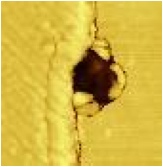Sep 6 2012
Researchers from CIC nanoGUNE, in collaboration with the University of Munich and the German company Neaspec GmbH, manufacturing leader of near field optic microscope equipment, have developed a new technique which allows for the identification of the chemical composition of materials with nanometric resolution.
 Image obtained using the new nano-FTIR technique developed by CIC nanoGune researchers
Image obtained using the new nano-FTIR technique developed by CIC nanoGune researchers
The technique is based on the infrared spectroscope, a regular method for larger scales, but which until now was incapable of chemically identifying objects less than a few microns (1 micron = 1000 nanometres).
The infrared spectroscope consists of illuminating the sample with infrared light to later analyze the reemitted light which transports information on the chemical composition of the illuminated area.
The CIC nanoGUNE researchers have managed to increase the spatial resolution of this technique by using the metallic point of an atomic force microscope as an antenna to concentrate the infrared radiation on an extremely small area, achieving resolutions smaller than 20 nanometres.
This technique, baptised as nano-FTIR, was developed by the CIC nanoGUNE nano-optics group lead by Rainer Hillenbrand, and increases the resolution of conventional infrared spectroscopy.
This resolution, combined with the infrared spectroscopy’s high sensitivity to chemicals, makes this technique a tool of maximum interest in research and the quality control of chemicals in polymers, biomedicine and the pharmaceutical industry, being able to use it, for example, to identify contaminants in nanometric samples.
Source: nanoBasque.